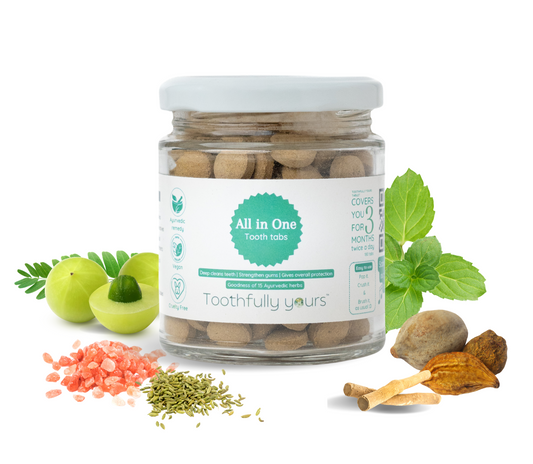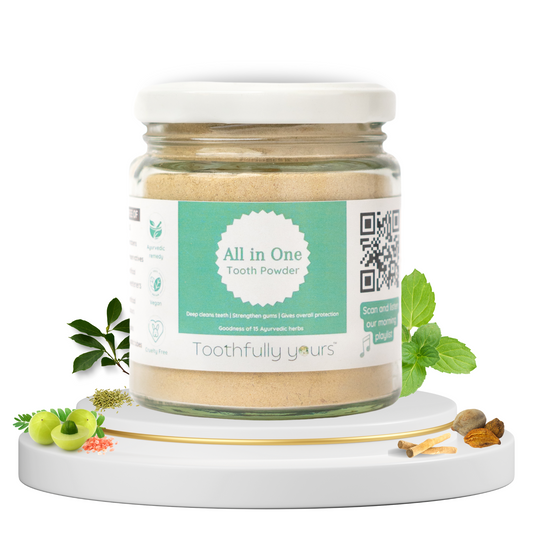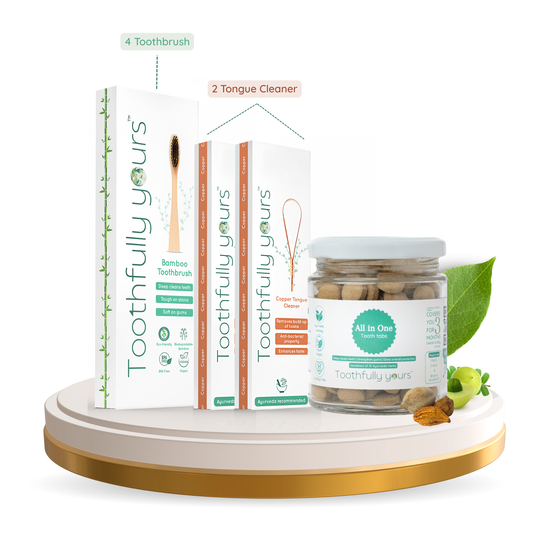
Why is oral care important?
Our oral cavity happens to be the entry point for our digestive and respiratory systems, and a doctor can tell a lot from our oral cavity about our overall health.
Filled with friendly bacteria that help us in -- breaking down the food with saliva, digestion, and maintaining overall oral hygiene. An infected oral cavity with bad bacteria can lead to many overall health issues. Infected oral cavities can also host bad bacteria responsible for plaque, cavities, bad breath, mouth ulcers, cavities, and many more.
In today's day and age, proper maintenance of oral hygiene with a good oral care routine is a must to lead a healthy lifestyle. As we happen to consume much softer food and 10x as much sugar as compared to our ancestors, just brushing once a day might not be the best oral care routine.
What is Oral Care?
As exfoliation, moisturising and cleaning comes under skin care; cleaning, conditioning comes under hair care; similarly brushing, tongue cleaning, flossing, massaging and other activities comes under oral care to keep you mouth cavity healthy. Oral care is about keeping our gums, teeth in good condition.
Reasons why Oral Care is important?
Oral care is one of the most important aspect to keep in check to live a healthy life. All our nutrition goes into our body from our mouth and our digestion starts in the mouth itself, hence it is very important keep our mouth free of bad bacterias, blood through bleeding gums and cavities. Some reasons to keep oral health in check with respect to overall well being -
1. Prevents Tooth Decay: The most common reason for good oral hygiene is to prevent tooth decay. Tooth decay is observed very commonly among children and young adults due high sugary diet and poor oral care routine. Regular brushing with clean, safe and highly effective ingredients, tongue cleaning and flossing at home are very important for preventing tooth decay.
2. Prevents Gum Disease: Gum disease is an infection of the gums that can lead to discomfort due to inflammation, bleeding, tooth loss and other serious health problems. Regular gentle massage of gums with medicated oil are the best way to keep gums in good health.
3. Prevents Bad Breath: Bad breath, or halitosis, is a common problem that can be caused by bleeding gums, dehydration, bad bacterias and others. Drinking plenty of water with regular tongue cleaning can help prevent bad breath.
4. Improves Self-Confidence: Healthy teeth and gums improves your self-confidence as your smile is shining with clean pearly teeth with good fresh breath and no discomfort.
5. Saves Money: Good oral care routine can help to save money in the long run by preventing more serious and costly dental problems from developing. Frequent dental visits for specific problem can come with heavy bills.
What Medical Conditions Can be Linked to Poor Oral Health?
1. Cardiovascular disease: Gum disease, called periodontitis, is associated with a higher risk of diseases that cause inflammation or blocking of the blood vessels. Researchers believe that harmful bacteria has easy access to the bloodstream through the weakened tissue in diseased gums, resulting in serious heart problems.
2. Respiratory infections: If a person has gum disease, the harmful bacteria thriving in the mouth can slide into the lungs. Individuals with gum disease and an otherwise weaker immune system due to age or chronic illness are more susceptible to pneumonia and other respiratory infections.
3. Pregnancy complications – If bad bacteria enters the bloodstream of a pregnant woman with periodontitis, there are chances it can also make its way to the developing baby and cause problems. The most common pregnancy complications associated with oral health are low birth weight and premature delivery.
Tips on Maintaining Good Oral Health
Good oral hygiene starts with a few basic habits that one can practise daily.
Brushing: Brushing twice a day is the basis of good oral hygiene. It helps keep your teeth clean, stops bacterial growth, and fights bad breath. Making sure that your oral care products do not contain any harsh toxic chemicals (like Sodium Lauryl Sulphate (SLS), fluoride, artificial colours, artificial sweeteners, and many more) and are made of natural and herbal ingredients (like neem, clove, babul, triphala, etc.) is very important. As glands in the oral cavity tend to absorb directly into the bloodstream very quickly, any exposure to toxic chemicals is very harmful in the long term.
Tongue scraping: Along with brushing, scraping the tongue is also very important. The scraping of the tongue helps remove toxins and bad bacteria and stops their growth. It also keeps the palate clean and improves the sense of taste.
Gum massage: One of the most important and most neglected steps in an oral care routine is massaging the gums. Massaging gums with finger tips improves blood circulation in the gums, keeps them clean, and makes them strong and firm. Stronger gums prevent the loosening of teeth due to their strong grip over them. In ancient times in India, people used to brush their teeth with their finger tips, which naturally massaged the gums; hence, they had strong teeth even at the age of 80.
Gargling: Thorough gargling is a very important mini-step in the oral care routine. As it is not possible to brush every time after a meal or a snack, gargling is the quickest way to remove any remains in the teeth, stop plaque formation, and keep fresh breath.
Flossing: Flossing is a great way to give your teeth and gums a thorough cleaning. Flossing once a day could be very beneficial or can be done on alternate days to keep gum lines and spaces between the teeth clean. It helps keep teeth clean in tough spots where a brush cannot reach properly and stops bad breath.
Oil Pulling: The ancient Ayurvedic practice of oil pulling involves swishing a tablespoon of oil (such as coconut or sesame oil) in your mouth for 10–15 minutes. Oil pulling is believed to remove toxins from your mouth, promote healthy gums, and freshen your breath. Oil pulling can be done once a week to keep oral health intact.
Healthy diet: Eat a balanced diet that includes plenty of fruits and vegetables, whole grains, and lean protein. Avoid sugary and acidic foods, which can erode your tooth enamel.
Conclusion
In conclusion, maintaining good oral hygiene is a very important step to maintaining good overall health. It is very crucial to check the ingredients of our oral care products before putting them into our mouth, as regular exposure to any toxic chemicals can lead to serious health issues.
Allow us to help you come closer to your sustainability goals and help you maintain your oral hygiene without any toxic chemicals.
Because we care.
We are,
Toothfully yours





